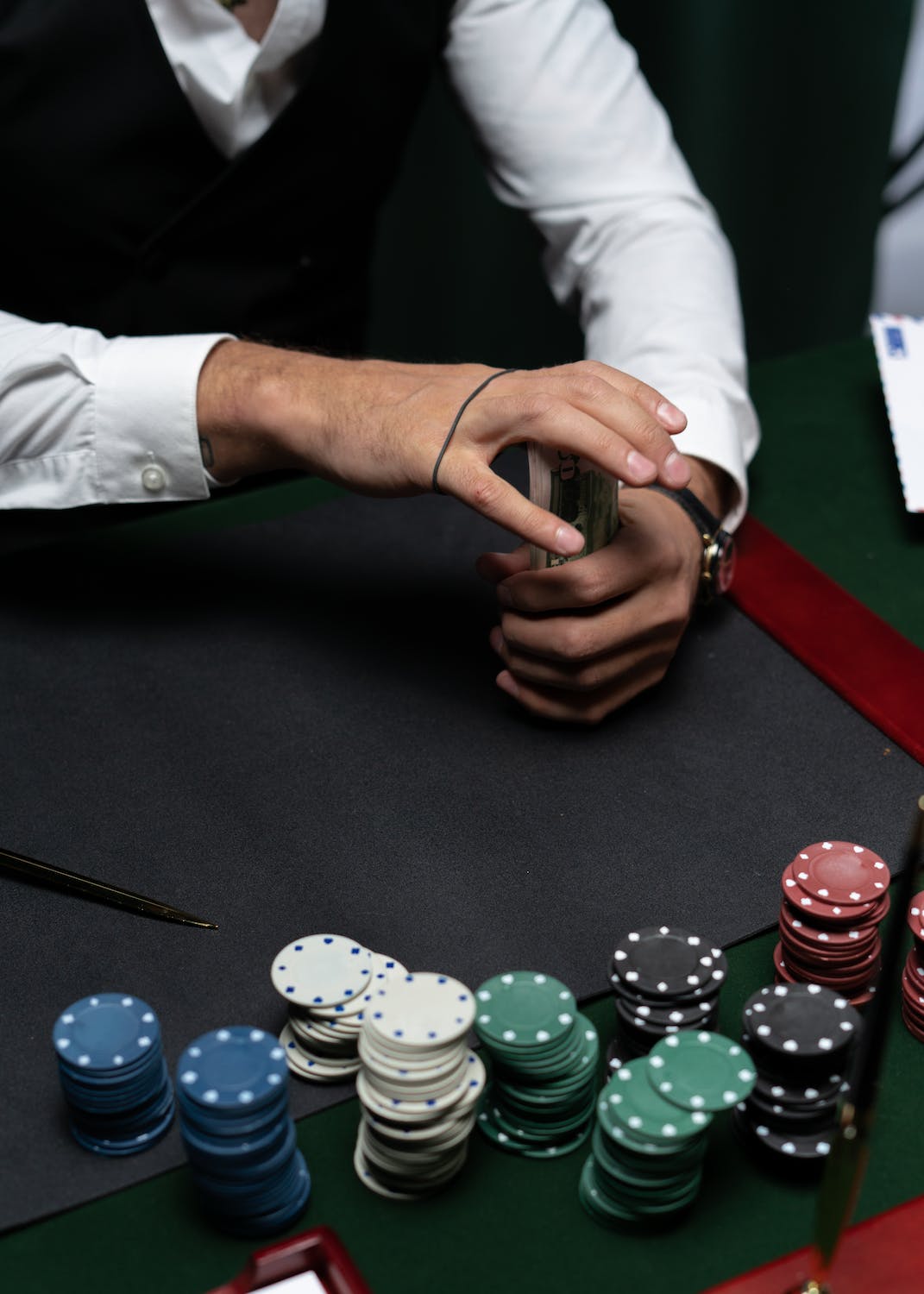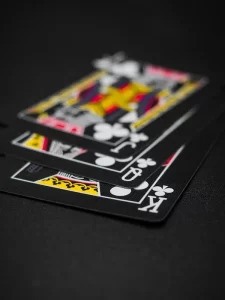Winning with Confidence: Developing a Champion’s Poker Player Mentality is a book that focuses on the mental aspect of playing poker. It provides insights and strategies on how to develop a winning mindset, build confidence, and overcome mental obstacles that can hinder success in the game. The book is written by Dr. Tricia Cardner, a renowned mental game coach, and professional poker player Jonathan Little. It is a must-read for anyone who wants to take their poker game to the next level.
The Psychology of Winning: How to Develop a Champion’s Poker Player Mentality
Confidence is not something that can be learned overnight. It is a mindset that must be developed over time. The first step in developing a champion’s poker player mentality is to understand the game. This means studying the rules, learning the different strategies, and practicing regularly. The more you know about the game, the more confident you will feel when playing.
Another important aspect of developing confidence is to learn from your mistakes. Every poker player makes mistakes, but the key is to learn from them and not repeat them. Analyze your game and identify areas where you can improve. This will not only help you become a better player, but it will also boost your confidence.
Confidence also comes from experience. The more you play, the more comfortable you will become with the game. This is why it is important to play regularly, even if it is just for fun. The more you play, the more you will learn about the game and the more confident you will become.
One of the biggest obstacles to developing confidence is fear. Fear of losing, fear of making mistakes, and fear of being judged by others can all hold you back. The key is to acknowledge your fears and then work to overcome them. This may mean taking small steps, such as playing in low-stakes games or practicing with friends before playing in a tournament.
Another way to develop confidence is to surround yourself with positive influences. This may mean finding a mentor or joining a poker group where you can learn from other players. It is important to surround yourself with people who believe in you and support your goals.
Visualization is another powerful tool for developing confidence. Before a game, take a few minutes to visualize yourself playing well and winning. Imagine yourself making the right decisions and staying calm under pressure. This can help you feel more confident and prepared when it is time to play.
Finally, it is important to remember that confidence is not the same as arrogance. A confident player knows their strengths and weaknesses and is willing to learn from others. Arrogance, on the other hand, can lead to overconfidence and poor decision-making.
In conclusion, developing a champion’s poker player mentality requires a combination of skill, strategy, and psychology. Confidence is a key component of this mentality, and it can make all the difference between winning and losing. By understanding the game, learning from your mistakes, playing regularly, overcoming your fears, surrounding yourself with positive influences, visualizing success, and avoiding arrogance, you can develop the confidence you need to become a champion poker player.
Mastering the Art of Bluffing: A Key Skill for Confident Poker Players
Bluffing is not just about lying to your opponents. It is about creating a convincing story that makes sense based on the cards that are on the table. A good bluff requires careful observation of your opponents’ behavior, as well as an understanding of the game’s dynamics. It is a delicate balance between risk and reward, and it requires a certain level of confidence to pull off successfully.
Confidence is a crucial element of a champion’s poker player mentality. It is what separates the winners from the losers. A confident player is not afraid to take risks, make bold moves, and push their opponents to the limit. They know when to fold, when to call, and when to raise. They are in control of their emotions and can read their opponents like a book.
To develop a champion’s poker player mentality, you must first understand the importance of confidence. Confidence is not something that can be learned overnight. It is a mindset that must be cultivated over time. You must believe in yourself and your abilities, even when the odds are against you. You must be willing to take risks and make mistakes, knowing that failure is just a stepping stone to success.
One way to build confidence in your poker game is to practice bluffing. Start by playing low-stakes games with friends or online. Experiment with different bluffing techniques and see what works best for you. Pay attention to your opponents’ reactions and adjust your strategy accordingly. Over time, you will develop a sense of when to bluff and when to fold.
Another way to build confidence is to study the game. Read books, watch videos, and attend seminars on poker strategy. Learn from the experts and apply their techniques to your own game. The more you know about the game, the more confident you will be in your ability to make the right decisions.
Finally, surround yourself with other confident poker players. Join a poker club or online community where you can share tips and strategies with like-minded individuals. Play against players who are better than you and learn from their mistakes. The more you surround yourself with confident players, the more confident you will become.
In conclusion, mastering the art of bluffing is a key skill for confident poker players. It requires a certain level of confidence, strategy, and psychology. To develop a champion’s poker player mentality, you must believe in yourself and your abilities, practice bluffing, study the game, and surround yourself with other confident players. With these tools, you can become a master of the game and win big at the poker table.
Building Your Bankroll: Strategies for Confidently Managing Your Poker Finances
The first step to building a champion’s poker player mentality is to understand the importance of bankroll management. Your bankroll is the amount of money you have set aside specifically for playing poker. It’s important to have a dedicated bankroll because it helps you avoid the temptation to dip into your personal finances or borrow money to play. This can lead to a dangerous cycle of chasing losses and ultimately losing more money than you can afford.
To manage your bankroll effectively, you need to set clear goals and limits. Determine how much money you can afford to lose without it affecting your daily life, and use that as a starting point for your bankroll. Then, set limits on how much you’re willing to risk in each game or session. A good rule of thumb is to never risk more than 5% of your bankroll in a single game or tournament.
Another important aspect of bankroll management is tracking your wins and losses. Keep a detailed record of every game you play, including the buy-in, the stakes, and the outcome. This will help you identify patterns in your play and make adjustments as needed. It will also give you a clear picture of your overall profitability and help you make informed decisions about when to move up or down in stakes.
In addition to managing your bankroll, it’s important to develop a confident mindset when playing poker. This means trusting your instincts, making bold moves when necessary, and not being afraid to take risks. Of course, this doesn’t mean playing recklessly or without a plan. It means having the confidence to make the right decisions based on your knowledge and experience.
One way to build confidence in your poker game is to study the game and learn from the experts. Read books, watch videos, and attend seminars to learn new strategies and techniques. Practice these skills in low-stakes games or online before applying them in higher-stakes games. This will help you build confidence in your abilities and make better decisions at the table.
Another way to build confidence is to surround yourself with supportive people. Join a poker community or find a mentor who can offer guidance and encouragement. Having a support system can help you stay motivated and focused on your goals, even when things get tough.
Finally, it’s important to remember that confidence is not the same as arrogance. A confident poker player knows their strengths and weaknesses and is always looking for ways to improve. They are respectful of their opponents and understand that luck plays a role in the game. By maintaining a humble and respectful attitude, you’ll earn the respect of your peers and be more likely to succeed in the long run.
In conclusion, building a champion’s poker player mentality requires a combination of bankroll management, skill development, and a confident mindset. By setting clear goals and limits, tracking your wins and losses, and surrounding yourself with supportive people, you can develop the confidence you need to succeed at the poker table. Remember to stay humble, respectful, and always strive to improve your game. With these strategies in mind, you’ll be well on your way to becoming a winning poker player.
The Importance of Discipline: How Self-Control Can Make You a Winning Poker Player
Discipline is the foundation of success in poker. It is the ability to control your emotions, make rational decisions, and stick to your game plan. Without discipline, even the most talented players will struggle to win consistently. This is because poker is a game of variance, meaning that there will be ups and downs in the short term. It is discipline that allows players to weather the storm and stay focused on their long-term goals.
One of the most important aspects of discipline in poker is bankroll management. This refers to the practice of only playing with a portion of your total bankroll, in order to minimize the risk of going broke. A disciplined player will set aside a certain amount of money for poker and only play with a small percentage of it at any given time. This ensures that they can survive the inevitable downswings and continue playing for the long term.
Another aspect of discipline in poker is the ability to control your emotions. This is easier said than done, as poker can be a very emotional game. When you are on a winning streak, it is easy to become overconfident and start making reckless decisions. Conversely, when you are losing, it is easy to become frustrated and start playing too conservatively. A disciplined player will recognize these emotions and take steps to control them. This might involve taking a break from the game, meditating, or simply reminding yourself to stay focused on the long term.
Discipline also plays a role in decision-making. In poker, there are often multiple options available to you at any given time. A disciplined player will take the time to consider all of these options and make the best decision based on the information available. This might mean folding a strong hand if the odds are not in your favor, or making a bold bluff if you believe your opponent is weak. A disciplined player will not be swayed by emotions or external factors, but will instead rely on their own analysis and judgment.
Finally, discipline is important in terms of sticking to your game plan. Every player has a unique style of play, and a disciplined player will stick to their own style regardless of the situation. This means not getting distracted by the actions of other players, or deviating from your strategy based on short-term results. A disciplined player will have a clear understanding of their strengths and weaknesses, and will play to their strengths while minimizing their weaknesses.
In conclusion, discipline is a crucial component of success in poker. It is the foundation upon which all other skills and strategies are built. A disciplined player will have the self-control to manage their bankroll, control their emotions, make rational decisions, and stick to their game plan. By developing a champion’s mentality and focusing on discipline, you can become a winning poker player in the long term.
Mindfulness in Poker: How Being Present Can Help You Make Confident Decisions
Mindfulness is a state of awareness in which we are fully present in the moment, without judgment or distraction. In poker, mindfulness can help players make better decisions, stay focused, and avoid tilt (emotional reactions to bad luck or bad beats). By being present and aware of their surroundings, players can pick up on subtle cues and signals that can give them an edge over their opponents.
One way to develop mindfulness in poker is to practice meditation or other mindfulness techniques. This can help players learn to quiet their minds, focus their attention, and stay calm under pressure. By practicing mindfulness regularly, players can develop a sense of inner peace and confidence that can carry over into their poker game.
Another way to develop mindfulness in poker is to pay attention to your body and your emotions. When you feel anxious, stressed, or frustrated, take a moment to breathe deeply and center yourself. Focus on your breath, and let go of any negative thoughts or emotions. By doing this, you can clear your mind and make better decisions.
In addition to mindfulness, confidence is also key to winning at poker. A confident player is one who believes in their abilities, and who is not afraid to take risks. Confidence can help players make bold moves, bluff effectively, and stay focused even in the face of adversity.
To develop confidence in poker, players need to practice and study the game. They need to learn the rules, the strategies, and the psychology of the game. They need to analyze their own play, and learn from their mistakes. By doing this, players can build a solid foundation of knowledge and experience that will give them the confidence to make bold moves and take calculated risks.
Another way to develop confidence in poker is to visualize success. Before a game, take a few moments to visualize yourself playing confidently and winning. Imagine yourself making the right decisions, reading your opponents, and coming out on top. By doing this, you can create a positive mindset that will carry over into your game.
Finally, it’s important to remember that poker is a game of variance. Even the best players will experience bad luck and losing streaks. The key is to stay confident and focused, and to keep playing your best game. By developing a champion’s mentality, and by practicing mindfulness and confidence, you can become a winning poker player. Developing a champion’s poker player mentality involves building confidence, managing emotions, and making calculated decisions. By focusing on these key areas, players can improve their game and increase their chances of winning. It is important to approach each hand with a clear mind and a positive attitude, while also being prepared to adapt to changing circumstances. With practice and dedication, anyone can develop the mindset of a champion poker player and achieve success at the table.




